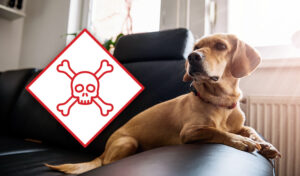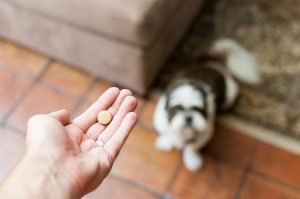Posts Tagged ‘pet poison’
What You Need To Know About Pet Poisons
 No pet owner wants to hurt their furry friend, but sometimes it is inevitable. Accidental poisonings can be prevented with simple switches in your home. One of the easiest ways to prevent an accidental poisoning is to watch what you plant in and around your house. While plants provide clean air for you home, they can also be really dangerous for pets based on what types of plants they are. Plants that aren’t toxic to humans like the hibiscus, those in the Easter lily family, mistletoe, and Dieffenbachia can cause medical problems in pets. Issues such as renal failure, irregular heartbeats, cardiac shock, or even death. Other examples of toxic plants include azalea, oleander, castor bean, sago palm, rhododendron, and Japanese yew. If you have these plants and cannot stand to give them up, put them up high in an unreachable location where your animal cannot chew or dig them up
No pet owner wants to hurt their furry friend, but sometimes it is inevitable. Accidental poisonings can be prevented with simple switches in your home. One of the easiest ways to prevent an accidental poisoning is to watch what you plant in and around your house. While plants provide clean air for you home, they can also be really dangerous for pets based on what types of plants they are. Plants that aren’t toxic to humans like the hibiscus, those in the Easter lily family, mistletoe, and Dieffenbachia can cause medical problems in pets. Issues such as renal failure, irregular heartbeats, cardiac shock, or even death. Other examples of toxic plants include azalea, oleander, castor bean, sago palm, rhododendron, and Japanese yew. If you have these plants and cannot stand to give them up, put them up high in an unreachable location where your animal cannot chew or dig them up
Your cat may love to snack on some grass outside, but this grass can be loaded up with deadly fertilizers and pesticides. Instead, you could make an indoor mini lawn for your cat. Mini lawns provide a safe, edible source of greenery. Special feline gardens are available commercially or you can start your own kitty garden using a bowl, soil, and grass seed. You could also grow catnip for you cat, but make sure to monitor how much your cat chews. While catnip is not generally toxic for cats, too much of the plant can overstimulate your cat’s central nervous system and cause a cat to injure themselves.
If you find that your pet was chewing on a plant, immediately remove the plant from their mouth and rinse their mouth gently with water. Identify which plant your pet was eating and call the poison center or your veterinarian. Be sure to watch for excessive or foamy salivation and changes in the skin around the mouth, eyes, or paws.
Another common cause of accidental poisonings is giving your pet something intended for a human. This could include people food, chemicals, or even medications. People often make the mistake of thinking that people food is ok for pets. Sometimes it is and sometimes it is not. Be sure to avoid milk, bones, chocolate, onions, rich and fatty foods, grapes, raisins, coffee, nicotine, and alcoholic beverages.
Like a child, one should poison-proof their house. Be sure to keep the cleaning products in a high, closed cabinet. There should be nothing below counter level because liquid drain cleaners, as well as tub and tile cleaners, can be lethal. Be sure to take precautions in the garage as well. Insecticides and auto care liquids need to be store high off of the ground to keep your pets from getting into them. Accidental chemical poisonings can even be made in giving medication. Avoid this by reading the label. For example, be sure to read the labels of flea control for your pets because the chemicals in dog flea agents are lethal for cats. Be sure to read the label directions and amounts carefully.
Some pet owners think that human medication will work for pets. This is incorrect. Never give your pet a human medication without consulting with your veterinarian. Even something as simple as aspirin can be lethal to your pet. Products such as acetaminophen and any aspirin product can cause stomach bleeding. Products like birth control and vitamins can also cause internal bleeding.
Cats tend to be attracted to unusual flavors. Be sure to keep things like the calamine lotion, diaper cream, sunblock, etc. away. These products contain an acid related to aspirin in them and will be toxic if ingested. Overall, small actions you take can help prevent the poisonings of your pets and keep them health. If you have any questions, feel free to contact Dr. Olsen at Olsen Veterinary Clinic at 618-656-5868.
Human Medications and Pet Medications Are NOT Created Equal
 In today’s society, almost everyone has some medications – whether over-the-counter or prescription sitting around at home. The important thing to remember, however, is that human medications and pet medications are NOT created equal. While some human medications are safe, some can be very toxic to pets if they happen to ingest them. As a matter of fact, the Pet Poison Hotline reports that nearly 50% of the calls involve human medications. These issues can arise if your pet accidentally chewed into the pill bottle or a well-intentioned pet owner gave their pet a human medication. Pet poisonings are common, can be very serious, and spell disaster for a beloved pet.
In today’s society, almost everyone has some medications – whether over-the-counter or prescription sitting around at home. The important thing to remember, however, is that human medications and pet medications are NOT created equal. While some human medications are safe, some can be very toxic to pets if they happen to ingest them. As a matter of fact, the Pet Poison Hotline reports that nearly 50% of the calls involve human medications. These issues can arise if your pet accidentally chewed into the pill bottle or a well-intentioned pet owner gave their pet a human medication. Pet poisonings are common, can be very serious, and spell disaster for a beloved pet.
With that in mind, listed below are 10 medications that can cause toxicity to your pet and therefore should be kept away from them.
NSAIDS – Non-Steroidal Anti-Inflammatory Drugs are common, everyday drugs that are found in most households. This classification includes popular drugs like Aleve, Advil and Motrin. The side effects can be some of the most dangerous drugs for pets to ingest. In fact just 1 or 2 pills can cause pets to suffer serious stomach and intestinal ulcers and in some cases cause kidney failure.
Acetaminophin – For that occasional headache or fever, almost everyone has some Tylenol sitting around their home. As safe as it is for children the opposite is true for pets. Just a small dose of acetaminophin can cause damage to your pet’s red blood cells, reducing its ability to carry oxygen through the body. The drug can also cause liver damage in your pet.
Birth Control Pills – Dogs usually mistaken the birth control containers for toys, but if they swallow a large number, they can get ill. Estrogen and Estradiol have shown to cause bone marrow suppression in pets. Surprisingly, female pets have an increased risk of suffering from the most serious side effects.
Antidepressants – Veterinarians have at times prescribed medications meant for humans to pets like Prozac. When used as your veterinarian has prescribed, they are safe. But accidental or overdose can be toxic to your pet. These clinical signs can include serious neurological problems that include sedation, loss of coordination, tremors and even seizures.
ADHD/ADD Medications – Prescription medications for this human condition are very strong stimulants like amphetamines and are very dangerous for pets. Ingestion of small amounts can cause life-threatening tremors, seizures, elevated body temperature and heart problems. Drugs in this category include Adderall, Ritalin and Concerta.
Benzodiazepines and Sleep Aids – Drugs like Xanax and Ambien are given to humans to reduce anxiety and help sleep better. However in pets, it can cause the opposite. It has been shown that small doses can cause pets to be agitated, along with severe lethargy, incoordination, and a slowed breathing rate. In cats, it has been known to cause liver failure.
Beta-blockers – Beta-blockers are commonly prescribed drugs for humans suffering from blood pressure problems. But all it takes is a small amount for pets to ingest to make it life-threatening to them. These drugs can cause severe drops in blood pressure and a very slow heart rate.
Ace-Inhibitors – Like in humans, these drugs are often used in veterinary medicine to treat pets suffering from high blood pressure. Though typically safe, overdoses can cause low blood pressure, dizziness, and weakness. If pets have ingested just a small amount of this medication, they can be monitored at home unless they have kidney failure or heart disease.
Cholesterol-Lowering Drugs – Drugs like Lipitor are advertised on the TV and are now found in many households in America. While these drugs are considered statins, long term use can potentially leads to problems. In most cases, one may see some mild form of intestinal upset which would include vomiting or diarrhea.
Thyroid Hormones – These medications are routinely prescribed for pets that have underactive thyroids. Surprisingly the thyroid hormone needed to treat dogs is much higher than a persons dose. So, if dogs accidentally get into thyroid hormones, it rarely results in problems. In cats it can be a different story. Large overdoses in cats can cause muscle tremors, nervousness, panting, a rapid heart rate and aggression.
Most pets are naturally curious creatures so it is important to keep them out of reach from your pets. Here are some tips to help ensure that they never ingest your medicine.
- Never leave loose pills in a plastic sandwich bag-the bags are too easy to chew into. Make sure the rest of the family does the same, keeping their medications out of reach.
- If your medication is in a pill box or weekly pill container, make sure that it is safely stored in a cabinet. Too many pets may think that it is a plastic toy.
- Never store your pets medication near your medications. Pet poisonous hotlines received several calls every year from concerned owners who have inadventantly given their own medication to their pet.
- Hang up your purse or backpack. Curious pets will explore the contents of your bag and simply placing it out of reach solves the problem.
A lot of pet poisonings stem from pets ingesting human drugs and pets metabolize the drugs differently than humans do. So because of this, even safe over-the-counter medications may cause serious poisonings in pets.
If your pet has ingested a human over-the-counter or prescription or medication, please call your veterinarian, your local emergency animal hospital or the Pet Poison Hot Line’s 24 hour animal control center at 800-213-6680 immediately. Of course, if our office can be of any assistance, do not hesitate to call or contact us here.
